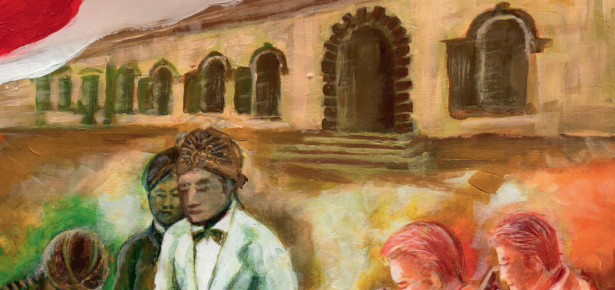
In Indonesia, 20 May is National Awakening Day (Hari Kebangkitan Nasional). It commemorates the founding of the first nationalist association in the Dutch East Indies. On this day in 1908, retired physician Wahidin Sudirohusodo, medical student Sutomo, and several other students at the Batavia Medical College (STOVIA), founded Budi Utomo. The STOVIA building now houses the Museum of National Awakening (Museum Kebangkitan Nasional). In addition to heroic struggle by bands of young men (pemuda) and the long lost Majapahit kingdom, physicians and medical students play a modest but definite role in narratives of the birth of the Indonesian nation.
As historian of medicine Warwick Anderson once argued, “the clinic and the laboratory should be added to those sites where the nation – any nation – may be imagined.” Indonesian physicians and medical students actively imagined the nation-to-be from these sites. And they had a medical laboratory they could be proud of. The future Nobel prize winner Christiaan Eijkman had brought the latest laboratory equipment from the Netherlands in the 1880s, for his research on the causes of beri-beri. After that, the newest medical technology continued to arrive apace, and soon after the x-ray machine was invented, one was despatched to the Batavia medical laboratory.
The connection between Budi Utomo and Indonesian independence is far from straightforward. In my book Nurturing Indonesia, I highlight the ambiguities, ambivalence, and paradoxes in the attempts of physicians and medical students from the archipelago to “nurture” Indonesia. To begin with, Budi Utomo was a Javanese organisation, focused on improving the fate of the Javanese; it did not have archipelago-wide aspirations. Second, its founding members, before conservative forces took over, were probably the least Javanese individuals on the island of Java. They spoke Dutch with each other; indeed many could hardly speak Javanese. Before World War I, they were more impressed by modernity and by the “West” than they were by Javanese culture. They were enthralled by the promises of progress, which were to be realised through science, technology, and medicine. They were a group of professionals, priding themselves on their cosmopolitan identity and international orientation. They wore Western clothing, played chess, and set up a Hawaiian band.
Abdul Rivai, one of the first Indies physicians to engage seriously in politics, was an ambitious man, enamoured by all that was modern. He advocated closer associations between the Netherlands and the Dutch East Indies. His journalism, first, and then his contributions as a commentator on colonial politics and politician, were essential in mobilising young people across the archipelago. Tjipto Mangunkusumo, the most famous physician-nationalist from the Indies, advocated abandoning the Javanese language altogether because of its inherent elitism. He suggested that while Javanese culture was interesting enough as a hobby, it was hardly capable of guiding the people of the archipelago to a better future. He and several of his colleagues recommended that everyone should learn Dutch—the language of science, education, and the future.
How did this enthusiasm for whatever was Dutch amongst a group of cosmopolitan physicians lead, in the end, to anticolonial sentiment? Their initial disillusionment with the West came with their realisation that the Dutch did not live up to the rhetoric of their Ethical Policy, introduced in 1901. Decades later, access to education and healthcare were severely limited, and literacy rates remained very low.
Western idealism was efficiently shattered by World War I. Science and technology lent their power not only to agriculture and medicine, but to the perfection of human slaughter. After the war, the ideas of K.R.T. Radjiman Wediodiningrat, personal physician of the Sunan of Solo, became popular among nationalists. Taking his cue from European and North American orientalists and Theosophists, Radjiman heralded Indonesia’s indigenous culture as spiritual and communitarian in nature—an appealing alternative to the materialism and individualism of the West. He wanted to build a new nation up from the roots of Javanese culture. The nationalists pointed towards the lasting damage colonialism had inflicted on the archipelago’s organic communities. They looked to the former Kingdom of Majapahit, which had dominated most of the archipelago, and beyond. The splendour of Majapahit, they said, could be grow again from the ashes of Dutch colonialism. It was not without irony that Radjiman and other nationalists learned a good deal about Majapahit from Dutch scholarship.
As the social group that most resembled the Dutch colonialists in education, habits, tastes, and preferences, Indonesian physicians were typically conservative. The Indonesian medical profession was probably the last group on the archipelago that abandoned the Dutch language. They were cosmopolitan; they were well-traveled. A select few studied advanced degrees in the Netherlands. Some became members of the Indonesian Association (Perhimpunan Indonesia), the group which formulated the policy of non-cooperation that guided the nationalist movement after 1925. Their nationalism was fueled by their internationalism and cosmopolitanism, rather than their discovery of some essential Indonesian character.
Among physicians, ideas about the shape and character of the coming Indonesian nation and its people were highly diverse, and often incompatible. Yet, in the end, these intellectuals realised that achieving the promises of modernity—science, technology, medicine—were never going to become reality in a colonial regime, which was, by definition, governed by ulterior objectives. In the end, this realisation was the source of the anti-colonial sentiment of many Indonesian physicians.
[1] Warwick Anderson, The Cultivation of Whiteness: Science, Health and Racial Destiny in Australia (Melbourne: Melbourne University Press, 2002).
Nurturing Indonesia by Hans Pols is now available from Cambridge University Press
Latest Comments
Have your say!